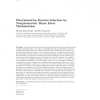Free Online Productivity Tools
i2Speak
i2Symbol
i2OCR
iTex2Img
iWeb2Print
iWeb2Shot
i2Type
iPdf2Split
iPdf2Merge
i2Bopomofo
i2Arabic
i2Style
i2Image
i2PDF
iLatex2Rtf
Sci2ools
147
click to vote
TKDE
2012
2012
Discriminative Feature Selection by Nonparametric Bayes Error Minimization
Feature selection is fundamental to knowledge discovery from massive amount of high-dimensional data. In an effort to establish theoretical justification for feature selection algorithms, this paper presents a theoretically optimal criterion, namely the discriminative optimal criterion (DoC) for feature selection. Compared with the existing representative optimal criterion (RoC, (Koller and Sahami, 1996)) which maximizes the information for modeling the relationship between input and output variables, DoC is pragmatically advantageous because it attempts to directly maximize the classification accuracy and naturally reflects the Bayes error in the objective. To make DoC computationally tractable for practical tasks, we propose an algorithmic framework, which selects a subset of features by minimizing the nonparametric Bayes error. A set of existing algorithms as well as new ones can be derived naturally from this framework. As an example, we show that the Relief algorithm greedily ...
Related Content
| Added | 29 Sep 2012 |
| Updated | 29 Sep 2012 |
| Type | Journal |
| Year | 2012 |
| Where | TKDE |
| Authors | Shuang-Hong Yang, Bao-Gang Hu |
Comments (0)

